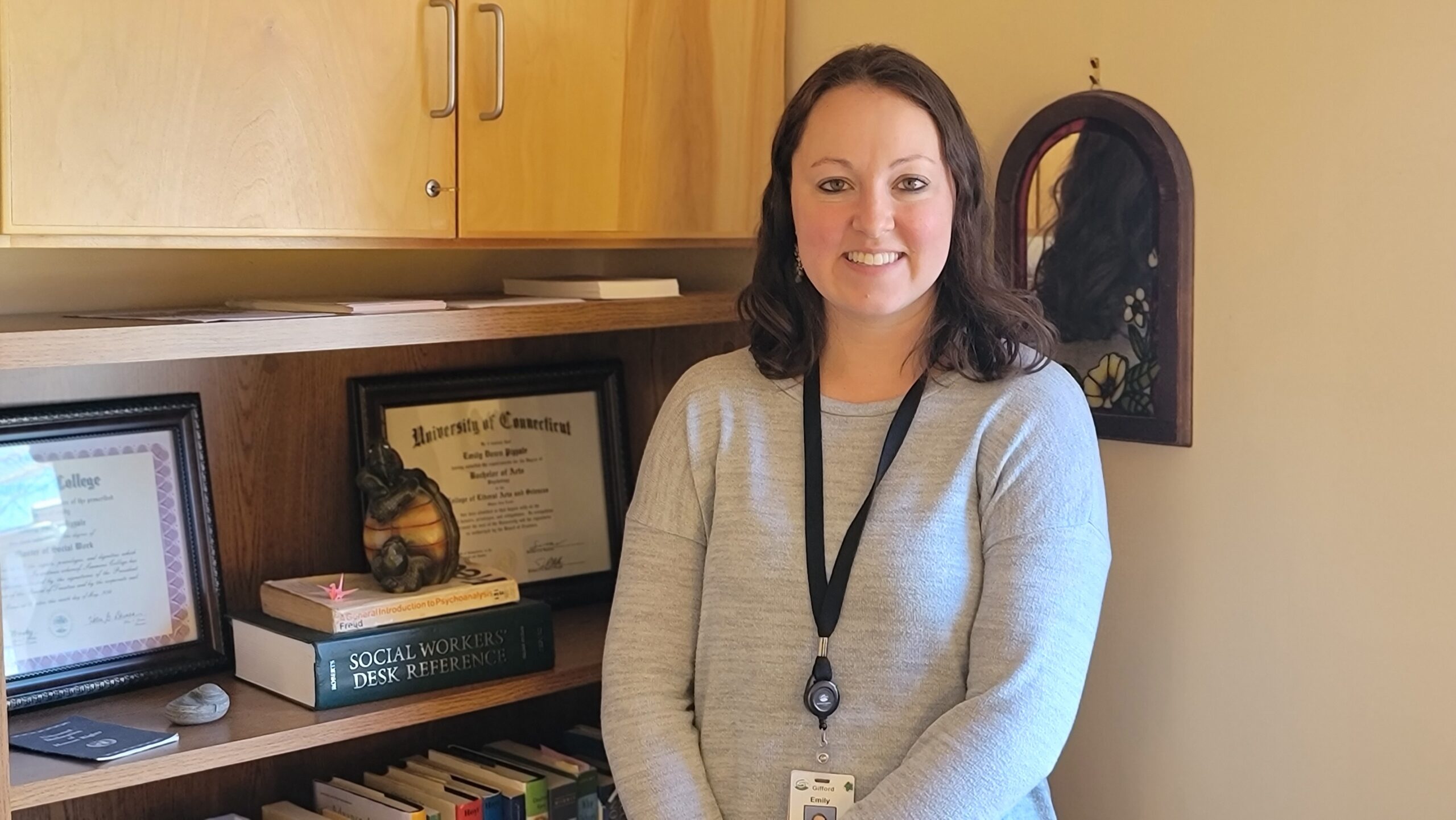
Gifford is committed to providing the highest-quality care to our patients at every stage of life, including during a serious illness and in one’s final days. To connect patients with hospice care, Gifford partners with BAYADA, VNAs of Vermont, and Central Vermont Home Health & Hospice. The following blog post about hospice care is co-authored by Gifford Outpatient Palliative Care Coordinator Emily Young, née Pizzale, and Holly Newcity, a community liaison with BAYADA in Norwich, Vt.
By Emily Young, LICSW, and Holly Newcity
Facing the reality of a progressive or terminal illness in a loved one is a deeply emotional and challenging journey. However, when it comes to ensuring their comfort and quality of life during their final days, timing matters more than you might think. Hospice care is not just about end-of-life care; it’s about making every moment count, embracing your loved one’s needs, and providing the support and guidance they need to navigate this transition. Here we’ll explore the benefits of starting hospice care sooner rather than later, what to expect, and how we can offer assistance and guidance.
Gifford’s Role
Gifford provides ongoing support, care coordination, and referrals to hospice and palliative services for patients and community members, whether on an outpatient or inpatient basis. As our outpatient palliative care coordinator, Emily Young, LICSW, is available to provide emotional support to patients and families experiencing serious illness, walk them through next steps, assist with referrals, provide resources, and coordinate care among other medical team members and community agencies involved in a patient’s care.
Gifford provides a palliative care consult through Dr. Cristine Maloney, who can visit patients and families in their homes to discuss goals of care, complete advance directives, review diagnosis and prognosis, and plan for next steps. On the inpatient team there are several Gifford team members available to connect patients and families to support and make referrals for those facing serious illness and/or end of life.
When is Hospice Recommended?
Hospice care is typically recommended when someone has been diagnosed with a life-limiting illness and is expected to have a prognosis of six months or less if the disease follows its course. It’s essential to remember that hospice is not about giving up hope, but rather shifting the focus from curative treatments to providing comfort, symptom management, and emotional support during the end-of-life journey. Some common situations in which hospice care may be recommended include:
- Advanced stages of illness: When a person’s condition has progressed to an advanced stage, and curative treatments are no longer effective or are causing more harm than good, hospice becomes a valuable option.
- Frequent hospitalizations: If someone experiences frequent hospitalizations due to complications or symptom exacerbations, hospice can offer an alternative that prioritizes comfort and quality of life at home or in a hospice facility.
- Declining functional status: When a person’s functional abilities decline significantly, making it challenging to perform daily activities or maintain independence, hospice can provide the necessary support.
- Limited response to treatment: If someone is no longer responding positively to treatments aimed at curing or slowing the progression of the illness, hospice focuses on alleviating suffering and enhancing the patient’s remaining time.
When Should Someone Be Offered Palliative Care?
Like hospice care, palliative care focuses on providing relief from the symptoms and stress related to a serious illness. Unlike hospice, palliative care can be offered at any stage of a life-limiting illness, and it can be provided alongside curative treatments. Caring for a loved one in hospice is recommended when someone has a prognosis of six months or less and the decision is made to prioritize comfort and quality of life. (Click here to learn more about palliative care at Gifford.)
The Benefits of Starting Hospice Sooner
As you consider the benefits of starting hospice care earlier in your loved one’s journey, you may have questions about how long hospice care lasts, when to begin this compassionate care, and everything that comes with it. One common question people have when faced with this decision is wondering how long hospice lasts. Hospice care guidelines should prioritize your loved one’s well-being and last as long as the support is needed. Hospice care is not about imposing a strict timeline; it’s about providing compassionate care that embraces your loved one’s unique needs and circumstances. Now, let’s delve deeper into the specific benefits of starting hospice care earlier:
- Accelerated relief and enhanced quality of life: People transitioning to hospice care often experience relief from pain and discomfort within 48 hours. Starting hospice earlier allows your loved one to enjoy an improved quality of life during their final days with a focus on maximizing comfort and dignity.
- Holistic support: Hospice care is not just about managing physical symptoms; it addresses emotional and spiritual well-being, too. Early hospice care provides your loved one with comprehensive support that embraces their overall needs.
- Extended life expectancy: Though it’s counterintuitive, individuals in hospice care tend to live 29 days longer, on average, than those who aren’t enrolled. In many instances, early hospice care offers loved ones more time to create cherished memories with family and friends.
###

